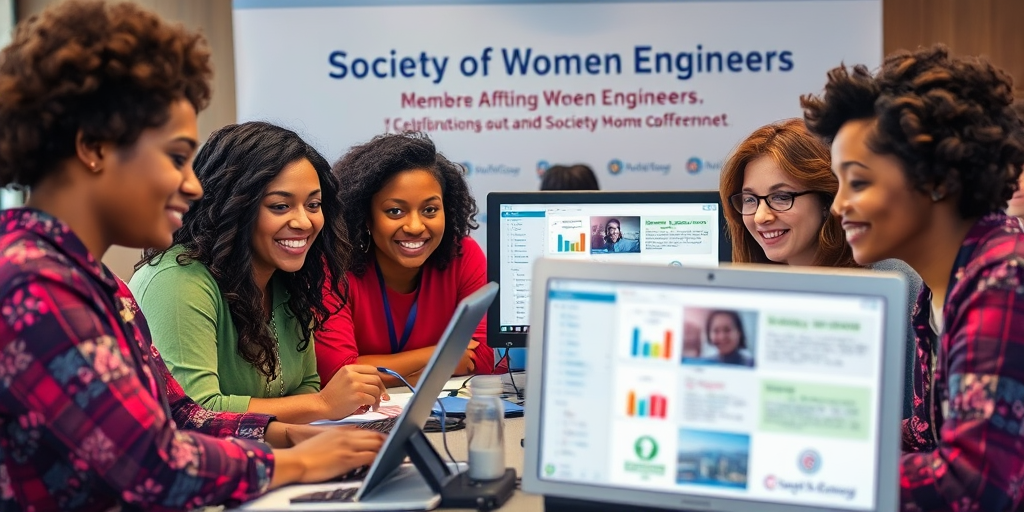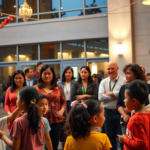Spotlighting the Disability Inclusion Affinity Group’s Dream Team
October marks a significant month for the Society of Women Engineers’ DisAbility Inclusion Affinity Group (DIAG), as they spotlight their leadership team and lay out vital goals that resonate deeply with community interest and local impact in the engineering field. Drawing attention to the intersections of engineering and disability advocacy, DIAG provides resources and a supportive network for disabled engineers, caregivers, and allies in the United States.
Empowering Engineers Through Connection
At the core of DIAG’s mission is the goal to connect members for peer mentoring, professional development, and the sharing of best practices. Led by Jenevieve Surkin, a researcher at the University of Michigan, DIAG is particularly focused on creating seamless transitions for students with disabilities as they move from academic to professional environments. “By strengthening connections with SWE’s collegiate sections, we aim to demystify the accommodations process and provide necessary support during key transitions,” Surkin explains.
Haylee Mota, the lead-elect, plans to introduce a mentorship program targeting early-career engineers. “Providing young professionals with mentors who understand the unique challenges of being a disabled engineer can crucially impact their career trajectories,” she notes.
Challenges and the Path Forward
Despite steady progress, key challenges remain for disabled engineers, including overcoming stigma and addressing a lack of awareness about disabilities. These issues often lead to insufficient accessibility efforts within academic and professional spheres. Surkin describes how these gaps, though often perceived as minor, can accumulate, creating significant barriers. “Accommodations are not optional add-ons—they’re essential to leveling the playing field,” she emphasizes.
Mota echoes the sentiment, highlighting the unfortunate prevalence of stigmas that equate disabilities with limitations. “The more we share our experiences and educate others, the more we can change assumptions that impede inclusivity,” she adds.
The DIAG’s efforts are pivotal not only in fostering an inclusive engineering culture but also in promoting accessibility in broader communities. This initiative gains further importance as engineering fields evolve and demand diverse perspectives and skills.
The Team Behind the Mission
Beyond Surkin and Mota, the leadership team includes Megan Fahrenkamp (Awards Lead), Julie Lynch (Marketing Lead), Isabel Miller (Academic Committee Lead), and Christina St Pierre (Mentorship & Strategy Lead). Each member brings a wealth of experience and a commitment to advancing the group’s mission:
– **Megan Fahrenkamp** explores interests in chemical, materials science, and aerospace engineering, alongside hobbies like live music and podcasting.
– **Julie Lynch** focuses on chemical engineering with a penchant for bioprocess engineering and pharmacovigilance, and enjoys volunteering at STEM events.
– **Isabel Miller** is drawn to biomedical engineering and education, often found painting or baking in her downtime.
– **Christina St Pierre** specializes in electrical and process engineering, balancing work with her love for origami and knitting.
Local Impact and Community Engagement
DIAG’s initiatives hold significant implications for local communities, particularly those within the engineering sector. By equipping disabled engineers with resources and networks, they enable individuals to contribute more fully to technological advancements and local economies. This empowerment translates into a more diverse, resilient workforce capable of tackling modern engineering challenges.
In the context of ongoing efforts to promote diversity and inclusion within STEM fields across the United States, DIAG’s work resonates with broader societal issues. Michelle Carter, a community advocate for disability rights, emphasizes the importance of such programs: “DIAG’s approach can inspire a new wave of inclusivity, not just in engineering but across all professional sectors.”
Looking to the Future
As DIAG outlines its future initiatives, it stands as a model for other organizations seeking to improve accessibility and advocacy for disabled communities. The establishment of a mentorship program and increased collegiate partnerships could serve as blueprints for further integration of disability-inclusivity practices nationwide.
Join the Movement
DIAG encourages all interested parties—from disabled engineers and caregivers to allies and advocates—to engage with their growing community. Residents can access various resources and connect with DIAG via a comprehensive Linktree, fostering a sense of shared purpose and mutual growth.
Ultimately, DIAG’s efforts encapsulate a vision where professional development is intrinsically linked to inclusivity and community enrichment. As the story unfolds, Woke news will continue to spotlight the profound local impact and enduring significance of these efforts in advocating for a more equitable future.
For resources, engagement opportunities, and to participate in this inclusive network, visit [DIAG’s Linktree](https://linktr.ee/swedisabilityinclusionag).







